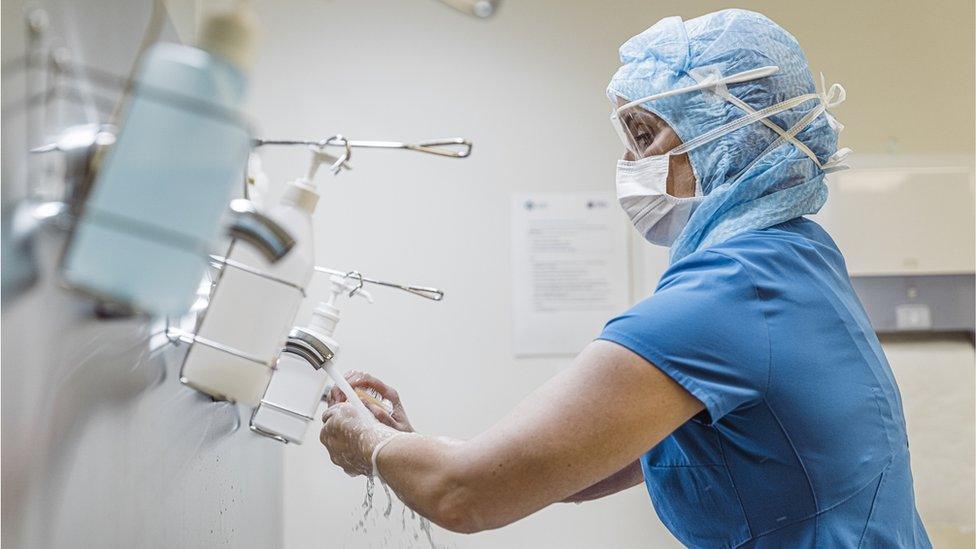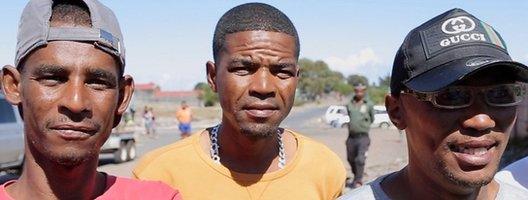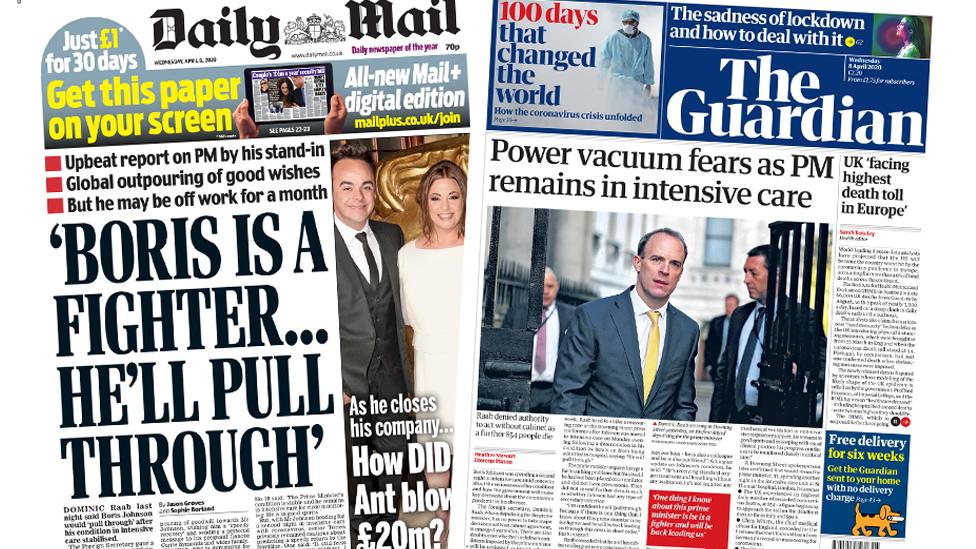Coronavirus briefing: Boris Johnson health latest and Wuhan lifts lockdown
- Published
If you want to get this briefing by email, sign up here
Johnson 'in good spirits'

The prime minister has spent a second night in intensive care with coronavirus. According to the latest update on Tuesday evening, he was "stable" and "in good spirits", but being closely monitored. Here we show you what goes on inside an intensive care unit, and hear from one survivor what a bad case of the disease can feel like.
Downing Street has confirmed that given Boris Johnson's illness, the review into the UK's coronavirus restrictions planned for next Monday will now take place at a later date. The curbs on personal freedom, the economy and more were initially imposed for three weeks. The government's chief scientific adviser, Sir Patrick Vallance, said on Tuesday the UK "could be moving in the right direction", but it would be another "week or so" before he could be sure.
Meanwhile, the first patients have been admitted to the new Nightingale Hospital in east London - although an NHS spokesperson stressed limits had not been reached at other sites in London. See how the 4,000-bed facility was built in just nine days. The NHS is also setting up a hotline to offer psychological support and other advice to healthcare staff. And cat owners are being told to keep their pets indoors during the pandemic.
The number of coronavirus hospital deaths in the UK rose to 6,159 on Tuesday, but a reminder for you of why we need to be cautious with those day-to-day numbers.
Around the world
The Chinese city of Wuhan - where coronavirus first emerged - has finally been released from lockdown. Train, road and rail connections have been re-established, and limits on economic activity and individual movement have been eased. Ordinary residents of Wuhan have been offering advice to others now going through what they have endured. But China's claims of success in the fight against coronavirus have raised eyebrows - here's why.
In the US, Tuesday brought the highest daily death toll so far, with a jump of 1,736. The nation's total now stands at more than 12,000. The family of singer-songwriter John Prine - known for songs such as Angel from Montgomery and Sam Stone - has confirmed his death from the disease. New York remains the epicentre of the US outbreak, but the state's governor says it appears to be nearing the peak. Twitter founder Jack Dorsey has pledged $1bn to help deal with the pandemic.
Elsewhere in the world, EU member states are arguing over how to tackle the economic fallout - southern nations like Italy and Spain think those further north, especially Germany and the Netherlands, are not doing enough. France, meanwhile, has tightened its social distancing rules as the death toll passed 10,000.
See all of the latest updates from around the world via our live page.


Festivals and furlough
Coronavirus is changing so much of our everyday lives. Social distancing is turning centuries-old religious festivals into virtual experiences. It has also made teachers out of the nation's parents, as children have been forced to stay away from the classroom. Our education reporter Hannah Richardson looks at whether we should be lowering our expectations of home-schooling. Finally, the pandemic has left many workers in a new world - furlough. Hear from some of those in that position who are feeling everything from guilt to gratitude.
Have Brits stranded abroad got home yet?
By Cherry Wilson, BBC News
So far, about 2,000 British nationals from seven countries have been brought back on flights organised by the Foreign Office. It's not free though - passengers have to pay for a seat, which has cost people up to £1,000. Luke Wallwork and his girlfriend Chiara paid about £250 each to get back from Peru. The 23-year-old, from Liverpool, believes it was down to the pressure UK tourists put on the government that finally made them take more action. "The response we got in the first week was that you're kind of on your own," he says.
One thing not to miss today

Listen up
The BBC World Service's More or Less programme looks at some of the statistics around coronavirus, for example, whether more men are losing their lives. And the Coronavirus Newscast team discuss the latest developments.
What the papers say

Fears of a power vacuum at the top of government feature prominently on the front pages. The Daily Telegraph says the prime minister's de facto deputy, Dominic Raab, is facing a situation "without recent historical precedent". Cabinet sources tell the paper senior ministers also have "differing views" on whether to extend the current lockdown. The Sun quotes another unnamed government figure who suggests Mr Raab is "heavily constrained" as the prime minister's stand-in and needs "collective responsibility on anything substantial". For the Guardian, the UK is facing a "crisis of authority" just as it grapples with "some of the most fraught political calls any peacetime government has had to make". Meanwhile, according to the Times, British biotech companies could soon be asked to work together to produce a finger-prick antibody test that could provide a possible route out of the lockdown.
From elsewhere


Need something different?
A selection of very different diversions for you this morning. Watch the story of Nasa's all female team of "aquanauts", who, in 1970, became the first women ever to take an active role in one of the space agency's missions. Or enter the world of a British aristocrat whose life of fairytale romance and unimaginable wealth turned into a nightmare when she and her partner fell out of favour with the Russian state. Finally, see some beautiful images of a "pink moon" lighting up skies across Europe on Tuesday night.